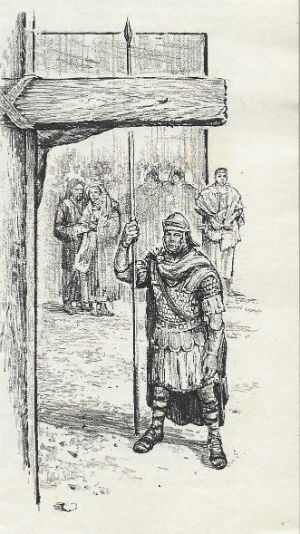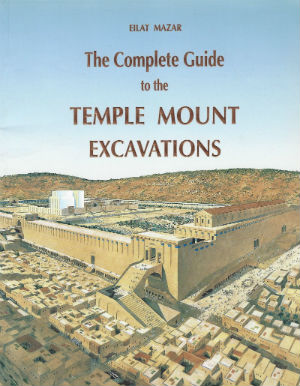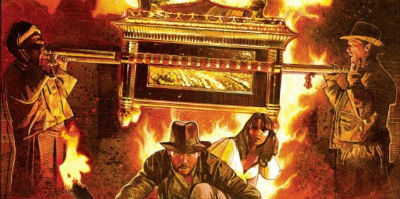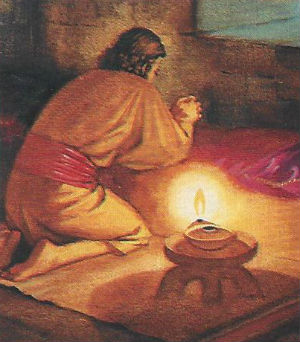 Jesus' one true sacrifice reached into past, present and future.
Jesus' one true sacrifice reached into past, present and future.By Neil Earle
 Jesus' one true sacrifice reached into past, present and future.
Jesus' one true sacrifice reached into past, present and future.A respected Scottish theologian once called Hebrews 9:14, the turning point in our salvation.
That’s the verse which reads (contrasting the old tabernacle system of blood offerings): “How much more, than, will the blood of Christ, who through the eternal Spirit, offered himself unblemished to God, cleanse our conscience from acts that lead to death, so that we may serve the living God.”
Obviously there’s a lot in that short verse we need to expound. First note how the Old Covenant itself predicted its own demise. In wrestling with how to approach God the prophet Micah found himself circumventing the Old Testament tabernacle system with a strong rejoinder:
“With what shall I come before the Lord and bow down before the exalted God? Shall I come before him with burnt offerings, with calves a year old? Will the Lord be pleased with thousands of rams, with ten thousand rivers of oil? Shall I offer my first-born for my transgression, the fruit of my body for the sin of my soul?
“He has showed you, O man, what is good, and what does the Lord require of you? To act justly and to love mercy and to walk humbly with God” (Micah 6:6-8)
Micah knew that God was aiming at heart religion – a service to God based on humility before the Great God and loving service to fellow man. David the Psalmist knew that after his sins of adultery and murder God would not look for the blood of bulls as much as a new heart and spirit from his servant. “You do not delight in sacrifice, or I would bring it; you do not take pleasure in burnt offerings. The sacrifices of God are a broken spirit; a broken and contrite heart, O God, you will not despise” (Psalm 51: 16-17).
Such far-reaching themes as these dominate the Book of Hebrews as we continue our survey. But first some overall points to consider.
 Even today the legend of the magnificent Jewish temple still fascinates. Looking southeast. Click photo to enlarge.
Even today the legend of the magnificent Jewish temple still fascinates. Looking southeast. Click photo to enlarge.First, no temple or tabernacle or daily ritual or this-worldly institution can win us favor with God. The Jews of the first century idolized the splendid temple of Solomon while Jesus predicted its utter destruction (Matthew 24:1-3). The temple of men’s hearts mattered most to Israel’s great teachers and still does.
Second, even when David conceived the idea of the temple – of moving the tabernacle “indoors” we might say – God chided him with the teasing words, “Heaven is my throne the earth is my footstool, where is the temple you will build for me.” Israel’s God did not dwell in temples of stone or inside gold-plated boxes called the Ark of the Covenant. The people often forgot that and began to mechanically serve the ceremonies and the splendid buildings more than God himself – one reason Jesus violently interrupted the temple service at the beginning of his ministry.
Third, no law can cover all the bases. Though the Law God gave Moses was described as “glorious” for keeping down crime, addressing poverty, criminal justice and environmental concerns (Deuteronomy 15), it could only go so far. Ultimately human relations can’t be resolved with a law. Remember when Peter asked if he should forgive his brother seven times and Jesus replied seventy times seven. These matters of the heart and mind are almost infinite in their effects.
What’s needed was a law inside the heart, a heart cleansed by the purifying application of a worthy sacrifice that covered sin for ever.
That’s exactly what the writer of Hebrews describes in chapters 8 and 9 and why he called the old covenant system “obsolete” (Hebrews 8:13).
 Ark of the Covenant makes the movies – apparently buried by Jeremiah on Mt. Nebo.
Ark of the Covenant makes the movies – apparently buried by Jeremiah on Mt. Nebo.
And before that verse is reached Paul reviews the old covenant tabernacle system and reiterates how the High Priesthood of Jesus is infinitely superior to the ritualistic priesthood of Aaron (Hebrews 8:1-6). The very next verses show what was needed, a law on men and women’s hearts, written by the living penmanship of the Holy Spirit. “I will put my laws in their minds and write them on their hearts. I will be their God and they will be my people” (8:10).
That was the purpose of the tabernacle system, for God to meet Israel the door. But, oh how they violated that privilege. Later, their leader Joshua was predict with a heavy paradoxical truism that they could not obey a holy god (Joshua 24:19). Yes, God would accept their sincere efforts at repentance as we saw in Psalm 51 with David, but…God would push the ultimate resolution of their failures to the future, to write them a promissory note, we might say, that was cashed at Calvary with Christ’s blood.
As Donald Hagner summarized: “All of the OT in one way or another points to and prepares for the fulfillment of God’s saving purposes accomplished through Christ” (Hebrews, page 156).
Similarly in Hebrews 9:1-10 where Paul described the ritual of the Jewish high priest sprinkling blood on the Ark of the Covenant once a year on the Day of Atonement. This too was teaching the people with eyes to see what God would ultimately accomplish in Christ. “It was a noble ritual, thing of dignity and beauty; but it was only an unavailing shadow,” write William Barclay, “The only priest and the only sacrifice which can open the way to God for all men is Jesus Christ” (Hebrews, page 101).
 King David found relief in heart-felt repentance.
King David found relief in heart-felt repentance.
All those external regulations taught the people and helped prepare the people for what Professor Tom Torrance called “the bewildering mystery of Jesus Christ.” The Holy Spirit is mentioned here because it is the Spirit which leads men and women to deeply grasp these wonderful truths. Jesus ascended to heaven to confirm acceptance of his blood sacrifice and by so doing achieved eternal redemption. At last has come the cleansing of the conscience. The blood of Jesus is retrospective in its effects. It looks backwards to cleanse the things we have a hard time forgetting even though we have been forgiven. (Every pastor has met people like that.) And it reaches forward to stand as the one true sacrifice for sins by which we receive the promise of eternal inheritance in the kingdom of God.
This makes possible our cleansing and forgiveness of all things past, present and future. The Bible teacher Westcott wrote of how the sacrifice of Jesus penetrates into the inner recesses of the human heart and soul as summarized by Barclay. The sacrifice of Jesus was moral not mechanical. It did not depend on human regulations relating to bulls and calves. It was made through the eternal Spirit and thus had an endless power, life and vitality to purge all stains and defilements, sins of the heart even more than sins of the flesh. “This thing on Calvary was not a matter of prescribed ritual mechanically carried out. It was a matter of Jesus obeying the will of God for the sake of men. Behind it there was not the mechanism of law but the choice of love.” (Page 105).
That one human life of the Son of God made flesh to visit us in our profound darkness – this gracious self-offering by the eternal Word from creation has the power to reach into the wicked heart of us all, cleanse it and send us forth renewed as a new creation in Christ. In the words of the hymn writer: “The vilest offender who truly believes/That moment a pardon from Jesus receives.”
Have you felt that assurance of full salvation in your deepest conscience? Sins of the past, secret sins, things long buried – these can be removed and the torment of them. You can experience it right now by asking him to come into your mind and psyche through the Holy Spirit and letting him work his wonderful transforming. Do not fear. Simply have faith and believe!